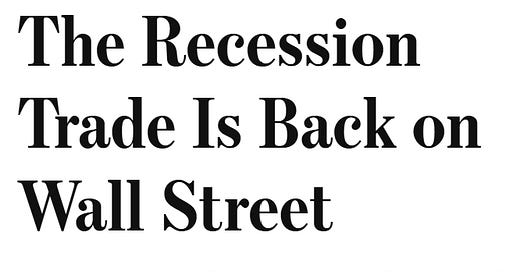Recession?! Hold on thar, pardner!
Some lights are flashing yellow, for good reason. But don’t over-torque on that Atlanta Fed forecast.
Above the fold in this AM’s WSJ:
JP Morgan’s recession model is reported to have jumped from 17% to 31% in recent days (note that 15% is the baseline here, meaning that’s the probability of a recession when growth is fine). The price of gold—a safe-haven trade amidst growth worries—is up $300 this year. And the most common citation in this space is the massive cliff dive by the Atlanta Fed’s GDPNow forecast, which currently has the 2025q1 real GDP growth rate at a very scary -2.8%.
To which I say: hold up.
As I written in many places, there are many—too many—good reasons to be worried about the path of the U.S. economy. In fact, we’re witnessing a remarkably troubling example of something I can’t remember seeing before: an administration inherited a strong economy running on all cylinders—solid consumption behind a persistently strong labor market alongside investment optimism, in tech, clean energy, chips, and business creation—and is in the process of squandering their inheritance much like that Russian kid in Anora.
They’re engaged in a series of own-goal kicks, mostly from their tariff agenda, but also from DOGE, as well as fiscal uncertainty regarding a near-term government shutdown and a longer-term worsening of the fiscal outlook. Consumers are rightfully worried about higher prices, and are not amused by President Trump’s dismissive “we’re okay with that.” Investors are clearly and understandably spooked by the policy lurching—does anyone think the North American auto-production chain can relocate to the U.S. in one month?—and spooked investors are sit-out-the-cycle investors.
The result of all this mishegoss is for now most evident in the softer data, polls and surveys, as I explain here. I can see some shadows in the hard data—the 0.5% real decline in consumer spending in January is the best example. But that may have been a blip (see prior link); you never want to over-torque on one-month’s data. The ADP jobs report came in well-below expectations yesterday for February but friends don’t let friends cite the ADP. It increasingly lacks correlation with the much more authoritative BLS, which we’ll get tomorrow AM (I’ll write it up here by around 9:30).
As for the GDPNow cliff dive, it was hugely distorted by an anomalous spike around imports (a negative in GDP math, but don’t tell Lutnick!), which more than explain its demise. Here’s how Goldman Sachs researchers explained what happened:
While we expect growth to slow this year, the latest data points are not as bad as they look. Most of the widening in the trade deficit reflects a surge in gold imports—which are excluded from GDP—driven by tariff fears. And weak consumer spending in January was likely driven by cold weather, residual seasonality, and normalization from a very strong pace in 2024H2.
So, please heavily discount the -2.8% from the Atlanta Fed, which is almost certain to improve as more data flows in (of all the GDPNow type models, I’ve found this one to be most elastic to the data flow; not a diss, to be clear, but worth remembering if you track such things).
But here’s the kicker: Goldman and most others are already significantly marking down their Q1 forecasts. My guess is the current GDPNow is far off on its negative magnitude but it’s directionally correct. Goldman, e.g., marked down their Q1 forecast from 2.2% to 1.6%, which would be below the recent trend—the average real GDP growth over the last 8 quarters is 2.9%--but far from recession.
Absent an outside shock, like the pandemic or a financial implosion, it’s hard to have a recession is this country that’s not accompanied by significant layoffs, and thankfully, we’ve not seen that yet. (As noted, check this space tomorrow for my writeup of the Feb jobs report—the BLS OG version!)
But just because a recession doesn’t look imminent doesn’t mean we’re out of the economic woods. To the contrary, federal policy appears stubbornly intent on turning around and marching back into those woods. They’re not there yet, and maybe they’ll come to their senses; the 1-month reprieve on the auto tariffs suggests at least a temporary recognition of these concerns.
But maybe they won’t.





GS says "And weak consumer spending in January was likely driven by cold weather," - that seems like motivated reasoning to me. People who live in cold areas don't change their habits because its cold - its always cold in the winter and we don't take it personally. They might delay shopping for a day if there is a blizzard. Also online shopping is always warm.
On jobs….do federal layoffs not count towards job losses that accompany recession? We will see what comes.